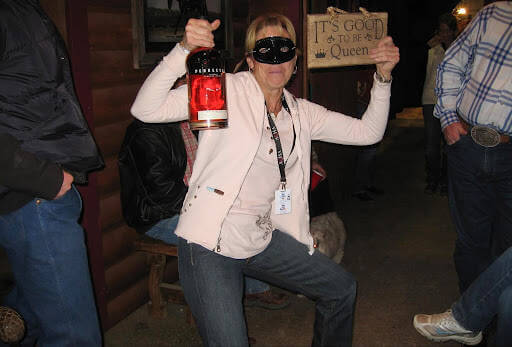Rita Crundwell: How One Woman Stole $53 Million From Her Own Hometown
Rita Crundwell was living the dream. From her role as the Comptroller and Treasurer of Dixon, Illinois, she controlled the town’s finances while running a multimillion-dollar horse breeding business on the side. She was the epitome of success: world championships in horse competitions, luxury cars, vacation homes, and an extravagant lifestyle that left her neighbors awestruck.
But behind all that glamor was a crime so shocking that it went down as the largest case of municipal fraud in U.S. history. Over the course of two decades, Crundwell quietly siphoned $53 million from her own town to fund her lavish existence, leaving Dixon to decay in a financial crisis.
Early Days: A Dream Life Hiding Dark Intentions
Born in 1953, Rita Crundwell seemed like your average Midwestern girl. Growing up on a farm near Dixon, she developed a love for horses, a passion passed down from her mother. Crundwell was a bright student, making the honor roll in high school, and was popular enough to land a spot on the homecoming court. By all accounts, she was a likable, diligent student with a promising future.
That future came fast. In 1970, she got her first job at Dixon City Hall through a work-study program. She graduated the following year and moved into a full-time job as the secretary to the mayor. Her climb to power was quick. By 1983, Crundwell became the Comptroller and Treasurer of Dixon, putting her in charge of the city’s finances. That’s where things began to unravel — or, more accurately, where Crundwell began crafting a secret double life that would eventually unravel in spectacular fashion.

The Largest Municipal Fraud In U.S. History Begins
It all started in 1990 when Crundwell opened a secret bank account under the name “RSCDA-Reserve Fund,” making it look like a legitimate city account. The name stood for “Reserve Sewer Capital Development Account.” Sounds official, right? It wasn’t.
In 1991, she started funneling city money into this secret account by creating fake invoices. That year alone, she transferred over $180,000. And from that point forward, she escalated her thefts, stealing an average of $2.5 million annually from Dixon. During the height of the global financial crisis in 2008, she embezzled a staggering $5.8 million — while the rest of the country was tightening its belt, Crundwell was living large.
Her salary as Comptroller and Treasurer? A modest $80,000 a year. But that didn’t stop her from living a lifestyle that would make a celebrity blush. Crundwell owned 400 horses, built a 20,000-square-foot barn complete with luxury trailers outfitted with flat-screen TVs, and purchased a second home in Florida. She splurged on designer clothes, jewelry, a 2009 luxury motor home, and more cars than anyone could reasonably need, including a 2005 Ford Thunderbird and a 1967 Chevrolet Corvette roadster.
Meanwhile, Dixon fell into financial chaos. City departments faced budget cuts, public services were slashed, and infrastructure projects stalled. To cover her tracks, Crundwell blamed the economy, the state’s delayed payments, and anything else that could divert attention from her multimillion-dollar heist.
How Did She Get Away With It For So Long?
How does someone steal $53 million without getting caught for over 20 years? The answer is shockingly simple: Dixon’s city government didn’t have proper oversight. Crundwell had nearly unchecked control over the city’s finances, and the financial commissioner tasked with overseeing her worked part-time for a meager $2,700 a year.
Even the auditors missed the signs. Crundwell’s reputation for being meticulous and hardworking made her seem beyond reproach. People trusted her. Even her lavish lifestyle didn’t raise enough eyebrows — most assumed her wealth came from her successful horse breeding business or an inheritance from a wealthy relative.
But in 2011, her house of cards began to fall.
The Beginning Of The End: Crundwell’s Arrest
In 2011, while Crundwell was on vacation, the city’s temporary comptroller took a closer look at the town’s finances. What she found was the RSCDA-Reserve Fund account — and it didn’t take long for her to realize something was very wrong. The account wasn’t funding city projects. Instead, it was funding Crundwell’s lavish lifestyle.
The temporary comptroller alerted Mayor Jim Burke, who wasted no time contacting the FBI. For months, the FBI monitored Crundwell’s activities, watching as she continued to deposit stolen funds into her secret account.
On April 17, 2012, federal agents walked into Dixon City Hall and arrested Rita Crundwell. By then, she had stolen over $53 million, leaving her hometown in ruins.
Where Is Rita Crundwell Now?
After her arrest, Crundwell’s story shocked not just the residents of Dixon but the entire country. How could one person steal so much for so long? On Nov. 14, 2012, Crundwell pleaded guilty to wire fraud and money laundering. In addition to a 19-year sentence, she forfeited nearly all her assets — including about 400 horses — and was ordered to pay full restitution to Dixon.
Despite these efforts, the town has only recovered about $40 million of the stolen funds, leaving the residents to grapple with the long-term consequences of her betrayal.
In 2021, after serving just eight years in prison, Crundwell was granted home confinement on her brother’s farm in Dixon. She is scheduled to be released from home confinement in 2029, much to the chagrin of many Dixon residents who feel her punishment didn’t fit the crime.
Lessons From A $53 Million Theft
The story of Rita Crundwell is a cautionary tale. It’s a reminder of the dangers of unchecked power and the devastating impact one person’s greed can have on an entire community. Dixon is still recovering from the financial damage caused by Crundwell’s theft, but her story has also served as a wake-up call for other municipalities.
As Gary S. Shapiro, the U.S. Attorney for the Northern District of Illinois, said, “This case serves as a painful lesson that trust, without verification, can lead to betrayal.”
What Can We Learn?
Rita Crundwell’s story isn’t just a tale of greed. It’s a stark reminder that even the most trusted individuals can betray an entire town if given unchecked control. Cities, companies, and organizations everywhere should take a page out of Dixon’s book: trust your employees, but always verify.
If Dixon had done that, maybe — just maybe — it wouldn’t have taken 20 years and $53 million to catch the woman who almost bankrupt the town.





